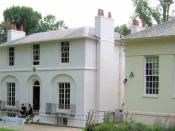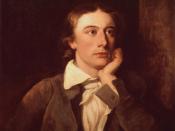John Keats was one of the most influential poets of the Romantic era. His poetry, which was all composed during the last five years of his short life (1775-1821), are massive in volume, beauty and skill. His works embody all the early romanticism ideals of naturalness, humanism, simplicity, and beauty, served as a standard for the later romantic poets to held up to, as well as the inspiration of people all around the world.
He was born the eldest of three brothers and a sister, to a fairly well off middle class family in London (Hanson). However, this did not withhold tragedy and hardship from his life. When he was only nine his father died and less than a year later his well-to-do grandfather died (Von Pape). The estate trustee who withheld the siblings' inheritance, due to a vague will, became their guardian after Keats' mother's death, in 1810 (Von Pape).
He attended and graduated from Guy's Hospital as an apothecary; however, long before he graduated his heart and mind were captured by poetry, and therefore never practised instead following his passion (Hanson).
His early poetry was not well received; critics attacked both the new romantic era poetry and Keats himself for being too common in nature (Motion, 266). Keats, however, was not deterred by this, realising his own talent he followed in the path of his literary heroes, Shakespeare, Milton, and Woodsworth, but in a new direction (Hanson). His poems pursued the principle of beauty in all things, and dealt with the complexities and conflicts of everyday life; he saw no need to discuss lofty ideals and philosophies when there was so much to the human experience. This was in sharp contrast to his predecessors, and older contemporaries who wrote formal epic poems, with only important people, places and...



Good
Good work with references. Also, it has a smooth move from the biography to the analysis.
0 out of 0 people found this comment useful.